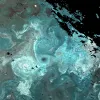Posted:
Even in the dark abyss of the deep ocean animal communities can undergo rapid, widespread and radical changes. Scientists at the National Oceanography Centre are at the forefront of monitoring these changes and understanding the mechanisms responsible. Their latest research is published in a…
Posted:
Autosub3, a robot submarine operated by the National Oceanography Centre (NOC), has been instrumental in revealing reasons for steady thinning of a vast glacier in Western Antarctica over recent decades.The new findings, which are important for understanding Antarctica’s potential contribution to…
Posted:
Iron is recognised as a nutrient, the lack of which limits plankton growth in some parts of the ocean. By adding small quantities of iron to the surface of the ocean, plankton growth can be stimulated (‘the iron hypothesis’), potentially providing a means of extracting carbon dioxide from the…
Posted:
Computer simulations performed by researchers at the National Oceanography Centre and the University of Glasgow show how oceanic stirring and mixing influence the formation and dynamics of plankton patches in the upper ocean. Tiny free-floating marine plants called phytoplankton live in vast…
Posted:
The United Nations has declared 8 June as World Oceans Day after the concept was proposed at the Earth Summit in Rio de Janeiro in 1992. The goal of World Oceans Day is to raise awareness of how vital the ocean is and its importance in daily life.Test your knowledge of the oceans by answering this…
Posted:
The Intergovernmental Oceanographic Commission (IOC) is starting its 50th anniversary celebrations on 8 June, World Oceans Day.In 2008, the UN General Assembly decided that, as from 2009, 8 June would be designated as ‘World Oceans Day’ to raise global awareness of the challenges faced by the…
Posted:
The 8th UK Sea Ice Group meeting will take place at National Oceanography Centre on Thursday 16 September and Friday 17 September 2010.Recent climatic changes in the Arctic Ocean and an unprecedented rapid decline of Arctic sea ice cover, occurring during the last decade, are anticipated to impact…
Posted:
A research cruise to the Celtic Sea sails on Wednesday 2 June 2010. The Celtic Sea is located in the North Atlantic Ocean between southern Ireland and southwest England (between approximately 48° and 51.5°N latitude and 5° and 12°W longitude). Professor Jonathan Sharples of the National…







